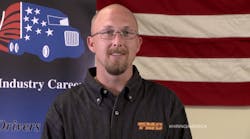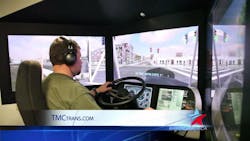As fleets and trucking companies struggle to get and keep the drivers they need, many have been looking to lure U.S. military veterans into the fold — and they're doing everything they can to make the connection. In one of the latest examples of reaching out to this community, trucking-specific hiring technology company FASTPORT has partnered with Hiring America, a TV show that helps veterans transition to civilian jobs.
Why this focus on veterans? Fleet companies say it's a good mutual fit. In reporting on this topic, Fleet Owner has heard that veterans have built-in advantages when it comes to operating commercial vehicles and adapting to the truck driver lifestyle. It's a highly regimented, structured job that often requires some time away from home, for example, and it could put you behind the wheel of serious machinery.
And veterans are familiar with those kinds of job parameters, notes Bill McLennan, CEO of FASTPORT. "They're used to working around equipment that moves. They know how to train and be trained and the importance of staying current in their skill set," he says on an episode of the show. "They're mission-oriented; they know how to achieve an objective; they work outside in all kinds of terrain and weather conditions.
"So there's a lot of similarities between what they do in the military and what the trucking industry does, and that's regardless of what their military occupation or specialty is," McLennan says.
Hiring America airs on 195 stations nationally as well as the American Forces Network reaching Dept. of Defense communities globally. On the first episode of the show to feature the new trucking slot — which will be recurring each week — viewers meet 11-year Marine Corps veteran Devin Tanner, who explains that his work as a logistician during his service is similar to that of a fleet manager or dispatcher/planner.
Working as a truck driver wasn't something he expected, Tanner says, but adds that so far he's "enjoying it pretty well." He describes his daily routine as an over-the-road driver for Des Moines, IA-based flatbed carrier TMC Transportation, notably mentioning the time away from home that's often part of military and truck driver life, and how he and his family — including his wife and their four children — manage it.
"The difference with being deployed overseas and then now being an over-the-road truck driver with my family is communication. Now, if my wife or my kids really want to talk to me, they can call me," Tanner says. "And they know that when I leave on Sunday, I'm not gone for six, seven, even nine months — they know that about four or five days later, I'm pulling in the yard ready to have dinner and carry on the weekend."
Going to greater lengths
TMC emphasizes that schedule of trying to get drivers home for the weekend, as well as other benefits like being an employee-owned company where everyone has a stake in profitability and getting ahead. Duane Boswell, TMC's vice president of recruiting and once a U.S. Army officer himself, says the company has always made a point of hiring veterans, also touching on something else: that veterans have the kind of character businesses want in their employees.
"TMC has hired veterans from day one," Boswell says. "There's a high value put on the soldiers' ability to live with structure and live up to high standards. TMC prides itself on having higher standards than most trucking companies, and frankly, we find that military veterans are the best people to maintain those standards." He adds that many drivers move up into the company's management ranks.
Cheryl Freauff, supervisor of recruiting at TMC and a Marine Corps veteran who served in Operations Desert Shield and Desert Storm, says the company has pledged to hire another 500 veterans in the next year but actually exceeded that number over the previous one. Freauff explains that TMC's apprenticeship program helps veterans take advantage of Post 9/11 G.I. bill benefits they may have available while training for the job.
Other trucking companies similarly help veterans utilize available benefits, and some even offer veterans higher starting pay and other enticements. Companies that'll be included in upcoming Hiring America episodes include Werner, Ryder, Clean Harbors, J.B. Hunt and Kenan Advantage Group.
While the truck driver shortage is widely acknowledged and reported on, FASTPORT's McLennan explains to Fleet Owner that utilizing every available avenue — hiring fairs and other special events, mobile apps, websites, the new TV slot and so on — to reach veterans has been necessary, and it's still not enough. The reasons for that have to do with the trucking industry and veterans themselves, he says.
"What we have found through our experience is that veterans are very difficult to reach," McLennan contends. "This is due to numerous factors including where they are stationed — all over the world and throughout the U.S. — their likelihood of being either deployed or on field maneuvers, their lack of accessibility when they are home, and the lack of a formal infrastructure to reach individual veterans transitioning out of the military."
Meanwhile, McLennan notes, the trucking industry has to overcome negative perceptions of jobs like being a truck driver. There also are many players in the industry, he adds, which can complicate the message. "Trucking needs a consolidated effort to compete for veteran talent against other industries — this is because our industry does not have a small set of well-known, dominant employers," he says.
In that vein, FASTPORT also has partnered with the U.S. Chamber of Commerce Foundation's Hiring Our Heroes program to create truckingtrack.org, which McLennan describes as "the on-ramp for transitioning veterans to great careers with great employers in the trucking industry."




